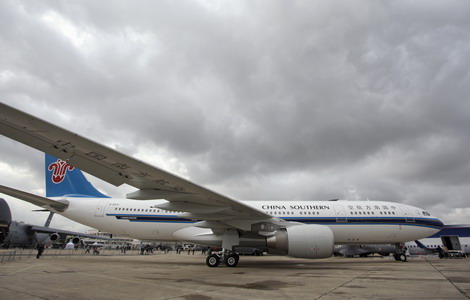Economy
Just the ticket for travelers?
Updated: 2011-08-24 10:01
By Wang Ying (China Daily)
|
 |
|
An Airbus A330-200, operated by China Southern Airline Co, stands on display at the Paris Air Show. Despite the fatal Wenzhou accident that has shaken policymakers and consumer confidence, China's airlines are still facing real competition because of the large-scale construction of high-speed railway links. [Photo / Bloomberg] |
To complicate matters, most of their earlier projections have been thrown into confusion by the fatal accident at Wenzhou in Zhejiang province on July 23, when two bullet trains collided, leaving 40 people dead and more than 190 injured.
The accident has shaken commuter confidence in the safety of the new rail network. Airline executives in Shanghai said that their strategies have been put on hold because it is hard to predict when confidence in the railway will return.
Originally, the traveling time between the two cities by high-speed rail was 5 to 6 hours for a distance of 1070 kilometers (km), compared with two and a half hours by air.
However, in the wake of the Wenzhou crash, the government has ordered the trains to run at reduced speeds, thus increasing the journey time.
The initial reaction of the airlines serving the route - mainly Air China Ltd, China Eastern Airlines Co Ltd and its subsidiary, Shanghai Airlines - has been to push prices back to levels last seen in the days before the high-speed rail link existed, around 1,130 yuan ($176) for a one-way ticket. Since the Wenzhou accident, many of the discounts offered on flights between the cities have all but evaporated as passengers have flocked back to air travel.
There were plenty of discounted air tickets in early July. The lowest price for a flight between Beijing and Shanghai fell to a mere 410 yuan one way, while the most expensive came in at 1750 yuan. However, the impact was short lived as airline occupancy rates gradually returned to as high as 90 percent in the fourth week of July, and the percentage of full-price tickets sold also grew steadily, according to reports in the Beijing News.
Transportation experts now hold the view that over the long term, the projected increase in passenger traffic will ensure the profitability of both the high-speed rail link and the airlines. However, airline companies are not about to ignore the competition.
"In the first week the Beijing Shanghai high-speed railway was officially put into use, the occupancy rate of China Eastern's flights between Beijing and Shanghai fell by 20 percent," said Luo Zhuping, board secretary of China Eastern Airlines.
Meanwhile, although the airlines' occupancy rates failed to reach the peak seen in July 2010 - when numbers were boosted by the tourism boom that accompanied the Shanghai World Expo - up to 90 percent of the seats were occupied this year, as the July summer vacation period is traditionally a busy month for air carriers, added Luo.

Specials

Biden Visits China
US Vice-President Joe Biden visits China August 17-22.

Star journalist leaves legacy
Li Xing, China Daily's assistant editor-in-chief and veteran columnist, died of a cerebral hemorrhage on Aug 7 in Washington DC, US.

Hot pots
Tea-making treasures catch the fancy of connoisseurs as record prices brew up interest